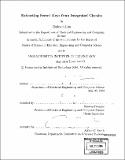Extracting secret keys from integrated circuits
Author(s)
Lim, Daihyun, 1976-
DownloadFull printable version (5.146Mb)
Other Contributors
Massachusetts Institute of Technology. Dept. of Electrical Engineering and Computer Science.
Advisor
Srinivas Devadas.
Terms of use
Metadata
Show full item recordAbstract
Modern cryptographic protocols are based on the premise that only authorized participants can obtain secret keys and access to information systems. However, various kinds of tampering methods have been devised to extract secret keys from widely fielded conditional access systems such as smartcards and ATMs. As a solution, Arbiter-based Physical Unclonable Functions (PUFs) are proposed. This technique exploits statistical delay variation of wires and transistors across integrated circuits (ICs) in the manufacturing processes to build a secret key unique to each IC. We fabricated Arbiter-based PUFs in custom silicon and investigated the identification based PUFs in custom silicon and investigated the identification capability, reliability, and security of this scheme. Experimental results and theoretical studies show that a sufficient amount of variation exists across ICs. This variation enables each IC to be identified securely and reliably over a practical range of environmental variations such as temperature and power supply voltage. Thus, arbiter-based PUFs are well-suited to build key-cards and membership cards that must be resistant to cloning attacks.
Description
Thesis (S.M.)--Massachusetts Institute of Technology, Dept. of Electrical Engineering and Computer Science, 2004. Includes bibliographical references (p. 117-119).
Date issued
2004Department
Massachusetts Institute of Technology. Department of Electrical Engineering and Computer SciencePublisher
Massachusetts Institute of Technology
Keywords
Electrical Engineering and Computer Science.